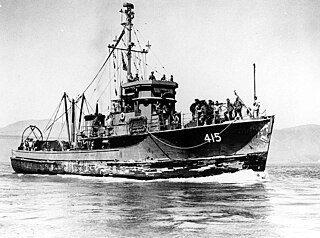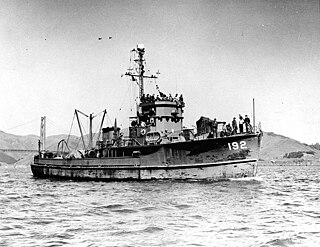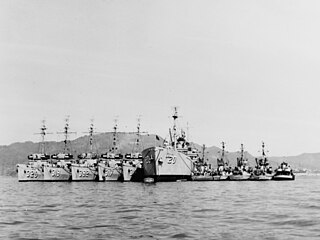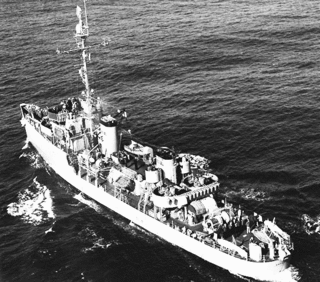 W
WAuxiliary motor minesweepers were small wood-hulled minesweepers commissioned by the United States Navy for service during World War II. The vessels were numbered, but unnamed. The auxiliary motor minesweepers were originally designated yard minesweepers (YMS) and kept the abbreviation YMS after being re-designated. The type proved successful and eventually became the basis for the AMS type of United States Navy minesweeper.
 W
WUSS Chatterer (AMS-40/YMS-415) was a YMS-1-class minesweeper of the YMS-135 subclass acquired by the U.S. Navy for the task of removing mines that had been placed in the water to prevent ships from passing.
 W
WUSS Chief (AM-315) was an Auk-class minesweeper acquired by the United States Navy for the dangerous task of removing mines from minefields laid in the water to prevent ships from passing, and named after the word "chief," the head or leader of a group.
 W
WUSS Condor was a YMS-1-class minesweeper of the YMS-135 subclass built for the United States Navy during World War II. She was the second U.S. Navy ship named for the condor.
 W
WUSS Curlew was a YMS-1-class minesweeper of the YMS-135 subclass built for the United States Navy during World War II. She was the fourth U.S. Navy ship to be named for the curlew.
 W
WUSS Defense (AM-317) was an Auk-class minesweeper acquired by the United States Navy for the dangerous task of removing mines from minefields laid in the water to prevent ships from passing.
 W
WUSS Devastator (AM-318) was an Auk-class minesweeper acquired by the U.S. Navy for the dangerous task of removing naval mines from minefields laid in the water to prevent ships from passing.
 W
WUSS Firecrest (AMS-10/YMS-231) was an YMS-1-class minesweeper of the YMS-135 subclass acquired by the U.S. Navy for clearing coastal minefields during World War II.
 W
WUSS Gladiator (AM-319) was an Auk-class minesweeper acquired by the U.S. Navy for the dangerous task of removing mines from minefields laid in the water to prevent ships from passing.
 W
WUSS Gull (MHC-46/AMCU-46/AMS-16/YMS-324) was a YMS-1-class minesweeper of the YMS-135 subclass acquired by the U.S. Navy for the task of removing mines that had been placed in the water to prevent ships from passing.
 W
WUSS Heron was a YMS-1-class minesweeper of the YMS-135 subclass built for the United States Navy during World War II.
 W
WUSS Hummer (AMS-20/YMS-372) was a YMS-1-class minesweeper of the YMS-135 subclass acquired by the U.S. Navy for the task of removing mines that had been placed in the water to prevent ships from passing.
 W
WUSS Impeccable (AM-320) was an Auk-class minesweeper built for the United States Navy during World War II. She was originally ordered as HMS Brutus (BAM-7) for the United Kingdom's Royal Navy under Lend-Lease, but was acquired and renamed by the United States Navy before construction began. She was commissioned in 1944 and served in the Pacific before being decommissioned in 1947. After the outbreak of hostilities in Korea, Impeccable was recommissioned in 1952 and served off Korea through 1952. She was decommissioned for the final time in October 1955 and placed in reserve. She was sold for scrapping in 1974.
 W
WUSS Kite was a YMS-1-class minesweeper of the YMS-135 subclass built for the United States Navy during World War II.
 W
WUSS Magpie (AMS-26/YMS-400) was a YMS-1-class minesweeper of the YMS-135 subclass built for the United States Navy during World War II.
 W
WUSS Merganser (AMS-26/AMCU-47/MHC-47) was a YMS-1-class minesweeper of the YMS-135 subclass built for the United States Navy during World War II.
 W
WUSS Mockingbird (AMS-27/YMS-419) was a YMS-1-class minesweeper of the YMS-135 subclass built for the United States Navy during World War II. She was the second U.S. Navy ship to be named Mockingbird.
 W
WUSS Murrelet (AM-372) was an Auk-class minesweeper acquired by the United States Navy to remove mines from minefields laid to prevent ships from passing. She was the only U.S. Navy ship named for the murrelet, a small sea bird found chiefly on islands in the northern Pacific Ocean.
 W
WUSS Osprey (AMS-28/YMS-422) was a YMS-1-class minesweeper of the YMS-135 subclass built for the United States Navy during World War II. She was the third U.S. Navy ship to be named for the osprey.
 W
WUSS Partridge (AMS-31/YMS-437) was a YMS-1-class minesweeper of the YMS-135 subclass built for the United States Navy in World War II.
 W
WUSS Pelican was a YMS-1-class minesweeper of the YMS-135 subclass acquired by the U.S. Navy for the task of removing mines that had been placed in the water to prevent ships from passing.
 W
WUSS Pirate (AM-275) was an Admirable-class minesweeper built for the U.S. Navy during World War II. She was built to clear minefields in offshore waters, and served the Navy in the North Atlantic Ocean and then in the Pacific Ocean. She was returned to active service for the Korean War. During Operation Wonsan she struck a mine and sunk. For her dangerous work, she was awarded four battle stars for her Korean War effort.
 W
WUSS Pledge (AM-277) was an Admirable-class minesweeper built for the U.S. Navy during World War II. She was built to clear minefields in offshore waters, and served the Navy in the Atlantic Ocean and then was transferred to the North Pacific Ocean. She survived the world war and was awarded one battle star, but, during the Korean War, she struck a mine and was sunk. She received the Presidential Unit Citation for her Korean service.
 W
WUSS Redhead (AMS-34/YMS-443) was a YMS-1-class minesweeper of the YMS-135 subclass built for the United States Navy during World War II. She was the first U.S. Navy ship to be named for the Redhead duck.
 W
WUSS Redstart (AM-378/MSF-378) was an Auk-class minesweeper commissioned by the United States Navy for service in World War II. Her task, as a fleet minesweeper, was to clear mines as the fleet proceeded into battle areas.
 W
WUSS Ruddy (AM-380) was an Auk-class minesweeper acquired by the U.S. Navy for the dangerous task of removing mines from minefields laid in the water to prevent ships from passing. She was the only U.S. Navy ship named for the North American ruddy duck.
 W
WUSS Shoveler (AM-382) was an Auk-class minesweeper acquired by the U.S. Navy for the dangerous task of removing mines from minefields laid in the water to prevent ships from passing.
 W
WUSS Surfbird (AM-383) was an Auk-class minesweeper built during World War II for the United States Navy. She was the only U.S. Navy ship named for the surfbird.
 W
WUSS Swallow was a YMS-1-class minesweeper of the YMS-446 subclass built for the United States Navy during World War II. She was originally laid down as PCS-1416, and, when renamed later in her career, became the third U.S. Navy ship named for the swallow.
 W
WUSS Toucan (AM-387) was an Auk-class minesweeper acquired by the United States Navy for the dangerous task of removing mines from minefields laid in the water to prevent ships from passing. She was the only U.S. Navy ship named for the toucan, a brightly colored and easily tamed bird of the American tropics, characterized by its large but thin beak.
 W
WUSS Waxbill (MHC-50/AMCU-50/AMS-39/YMS-479/PCS-1456) was a YMS-1-class minesweeper of the YMS-446 subclass acquired by the U.S. Navy for the task of removing mines placed in the water to prevent ships from passing.
 W
WUSS Waxwing (AM-389) was an Auk-class minesweeper acquired by the United States Navy for the dangerous task of removing mines from minefields laid in the water to prevent ships from passing. She was the only U.S. Navy ship named for the waxwing, any of several American and Asiatic songbirds which are for the most part brown and are characterized by predominant crests and velvety plumage.
 W
WUSS Zeal (AM-131) was an Auk-class minesweeper that served in both World War II and during the Korean War. As a steel-hulled fleet minesweeper, she was assigned to support the fleet by removing enemy mines whose purpose was to impede the path of the U.S. Pacific Fleet.